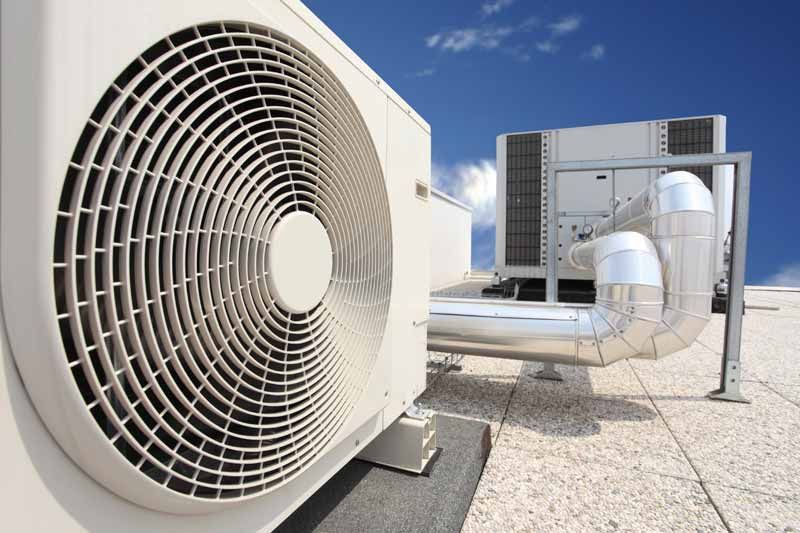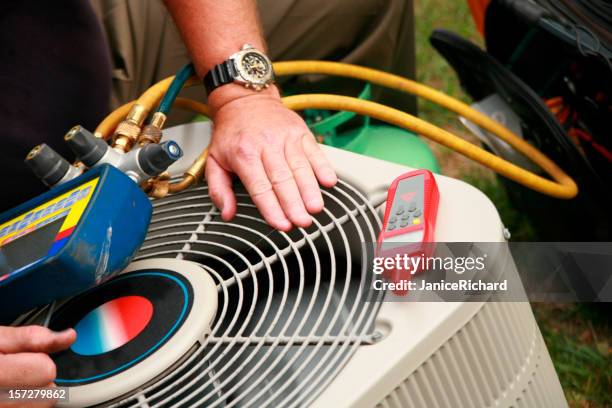Choosing In Between a Warmth Pump and Furnace: Secret Factors To Consider for Your A/c Requirements
When reviewing heating options for heating and cooling needs, the choice in between a heatpump and a heater can be complex. Each system provides unique advantages customized to details environments and power efficiency goals. Understanding these differences is crucial for making an educated choice. Key elements such as setup prices and environmental effect better complicate the selection procedure. Which alternative truly straightens with one's comfort and sustainability choices? The adhering to sections will certainly check out these factors to consider carefully.
Comprehending Warm Pumps: Exactly How They Function and Their Advantages
While numerous house owners think about various heating choices, understanding how warm pumps function and their benefits can greatly influence their choice. Heat pumps run by moving heat instead than generating it. In the winter season, they remove heat from the outdoors air or ground and transfer it inside your home, while in the summer season, they reverse this procedure, cooling down the home by removing heat outside. This dual capability makes them functional for year-round environment control.One of the primary benefits of heatpump is their energy performance. They utilize considerably much less power contrasted to typical heater, potentially causing lower utility costs (furnace replacement). Additionally, heatpump have a smaller sized carbon impact, making them an eco-friendly choice. They likewise require much less upkeep than conventional systems, adding to lasting expense financial savings. On the whole, comprehending the mechanics and advantages of heatpump can aid home owners make informed choices regarding their home heating and cooling down requirements
Exploring Heating Systems: Kinds, Procedure, and Benefits
Heating systems are available in various kinds, consisting of gas, electric, and oil designs, each with unique operational devices. Comprehending these differences is vital, as they impact performance and home heating efficiency. Furthermore, heaters supply many benefits, such as consistent heat outcome and dependability in cooler climates.
Kinds of Furnaces
Heater can differ considerably in design and operation, with heaters being a preferred selection amongst homeowners. There are numerous kinds of furnaces, each using various gas resources and modern technologies. Gas heating systems are usual, leveraging natural gas to produce heat successfully. Electric heaters, on the other hand, make use of electric resistance to generate warmth, frequently favored for their uncomplicated installation. Oil heaters, while less typical, are reliable in areas with minimal gas access (heat pump replacement ooltewah tn). Additionally, condensing furnaces maximize energy performance by catching and recycling exhaust gases. Each kind runs via a system of heat exchangers and ductwork to disperse warm air throughout a home. Understanding the distinctions between these furnace types is crucial for notified cooling and heating choices
Advantages of Furnaces
For property owners seeking trusted heat throughout cold months, the benefits of furnaces are substantial. Heating systems supply constant home heating, making sure also temperatures throughout the home. They are particularly reliable in severe chilly, often outshining heatpump in icy conditions. Numerous types, consisting of gas, electrical, and oil heaters, supply versatility to fulfill varied needs and preferences.Furnaces additionally have a tendency to have lower initial installation expenses compared to warm pumps, making them an extra easily accessible alternative for numerous. Their durable layout adds to a much longer lifespan, with several systems lasting over 15 years with appropriate maintenance. Additionally, modern-day heaters are often geared up with advanced technology for boosted efficiency, which can lead to lowered power bills. Overall, heating systems stay a trustworthy option for efficient home heating.

Power Efficiency: Comparing Warm Pumps and Furnaces
When contrasting energy efficiency between warm pumps and heating systems, the Seasonal Power Efficiency Proportion (SEER) plays a vital function in figuring out efficiency. Furthermore, a functional expense evaluation reveals the long-term economic implications of each system. Recognizing these aspects can assist property owners in making informed decisions concerning their home heating remedies.
Seasonal Power Effectiveness Ratio
Power performance plays a vital function in the decision-making procedure in between heatpump and heaters, especially when taking into consideration the Seasonal Energy Performance Ratio (SEER) This statistics measures the cooling efficiency of warmth pumps over a whole air conditioning season, giving a standard method to assess performance. Greater SEER scores show greater energy performance, equating to lower power usage and reduced energy expenses. In comparison, heating systems are commonly analyzed utilizing the Yearly Gas Application Efficiency (AFUE) rating, which mirrors home heating efficiency. When comparing these 2 systems, house owners ought to focus on SEER ratings for warmth pumps, as they straight influence total power financial savings and environmental sustainability. A comprehensive understanding of SEER can especially affect the lasting complete satisfaction and cost-effectiveness of the top article selected HVAC service.
Functional Cost Analysis
Recognizing the operational expenses connected with view website heatpump and heating systems is essential for property owners examining their alternatives. Heatpump commonly supply greater power performance, transforming electrical energy into warm with marginal waste. This causes reduced monthly utility expenses, especially in modest environments. Alternatively, typical heating systems, especially gas models, might have lower in advance expenses yet can sustain higher functional expenditures in time due to sustain costs and effectiveness ratings.Moreover, heatpump can operate as both home heating and cooling systems, possibly decreasing the need for separate heating and cooling systems. While first investments for heatpump might be greater, their long-term savings in power efficiency can make them an extra cost-efficient selection for many households. Mindful analysis of local power rates is important to identify the most effective choice.
Installment Costs: What to Expect for Each Furnace
Installation prices for home heating systems can vary significantly between heatpump and heaters, influencing house owners' decisions. Heatpump normally have higher in advance installation expenses, commonly ranging from $3,500 to $8,000, depending on the system size and intricacy of installation. This consists of the outside unit, indoor handling system, and required ductwork modifications. Conversely, heaters tend to have reduced first costs, averaging in between $2,500 and $6,000, which can be appealing for budget-conscious property owners. However, installation costs can enhance if extensive ductwork is required.Moreover, the selection of gas kind for heating systems-- gas, lp, or electrical-- can additionally impact setup prices. While warmth pumps supply energy performance, their preliminary financial investment might discourage some buyers. Inevitably, examining installation expenses along with long-lasting cost savings and efficiency will certainly help property owners in making informed choices concerning Get the facts their heating systems.
Environment Factors To Consider: Which System Carries Out Much Better in Your Location
How do climate problems affect the effectiveness of heating unit? The efficiency of heatpump and heaters can vary greatly depending on the neighborhood climate. In moderate environments, heatpump succeed by successfully transferring warmth from the outside air, making them an energy-saving choice. Nonetheless, their effectiveness diminishes in exceptionally cool temperature levels, where they may have a hard time to extract enough warmth. Alternatively, furnaces, especially gas designs, offer dependable and constant warmth no matter outside conditions, making them better in cooler regions.In locations that experience milder winters months, warmth pumps can run successfully year-round, offering both heating and air conditioning. On the other hand, regions with harsh winters frequently profit from the toughness of heaters. Inevitably, comprehending the neighborhood climate is important when deciding between a heatpump and a heater, as it directly affects their functional efficiency and total performance.
Maintenance Requirements: Long-Term Take Care Of Heat Pumps vs. Furnaces
While both heat pumps and furnaces need normal upkeep to ensure peak efficiency, their details demands and treatment routines differ substantially. Heating systems commonly need much less frequent interest, with yearly inspections sufficing to look for gas leakages, clean filters, and evaluate overall performance. Their less complex layout typically permits straightforward repairs.In contrast, heatpump necessitate biannual maintenance as a result of their dual role in home heating and air conditioning. This consists of cleansing coils, inspecting cooling agent degrees, and making sure that both the outside and interior systems work at their finest. In addition, warmth pump upkeep frequently includes even more complex components, making specialist servicing essential.Neglecting maintenance can result in diminished performance and boosted energy prices for both systems. Eventually, house owners must consider these long-term treatment requirements when selecting between a warm pump and a heater, as proactive maintenance can extend the lifespan and performance of either system substantially.
Environmental Effect: Picking a Sustainable Heating Option
The environmental influence of heater is a critical examination for house owners seeking sustainable choices. Heatpump are typically more energy-efficient than traditional heaters, as they transfer warm as opposed to produce it, significantly minimizing carbon discharges. By utilizing renewable resource sources, such as air-source or geothermal heatpump, homeowners can even more reduce their ecological footprint.On the various other hand, natural gas furnaces produce greenhouse gases and contribute to air contamination, though they typically provide greater warm result. Advancements in technology have led to the development of high-efficiency heaters that decrease emissions.Ultimately, selecting a heating system entails considering performance against environmental impact. House owners are urged to assess regional power sources and rewards for sustainable systems, ensuring a selection that lines up with both personal convenience and environmental responsibility. The choice affects not only prompt convenience yet also long-term sustainability and ecological health and wellness.
Regularly Asked Concerns
The Length Of Time Do Warm Pumps and Furnaces Usually Last?
The life expectancy of heat pumps commonly varies from 15 to 20 years, while heaters can last between 15 to thirty years. Routine maintenance substantially affects their durability and efficiency in giving home heating solutions.
Can I Utilize a Heatpump in Extremely Cold Climates?
Warm pumps can operate in very cool environments, yet their performance lessens as temperature levels decline. In such problems, additional heating resources might be needed to maintain comfy interior temperatures and assure peak efficiency.

What Is the Noise Degree of Warmth Pumps Versus Furnaces?
The noise levels of heat pumps and heaters differ considerably. Usually, heat pumps run more silently than typical furnaces, making them more suitable for those conscious seem, while heaters might generate louder operational sounds throughout heating cycles.
Are Warmth Pumps Suitable for Both Heating & Cooling?
Heat pumps are certainly appropriate for both cooling and heating (ductless mini splits). They function by moving warmth, supplying effective temperature level control year-round, making them a functional option for home owners looking for an all-in-one cooling and heating solution
What Size Home Heating System Do I Required for My Home?
Identifying the appropriate size heater for a home requires assessing factors such as square video footage, insulation top quality, regional environment, and the home's layout. Consulting a professional can guarantee an exact assessment and perfect convenience. Warm pumps typically supply higher power efficiency, converting electric power right into heat with minimal waste. In moderate environments, warmth pumps succeed by effectively transferring warmth from the outside air, making them an energy-saving option. On the other hand, furnaces, especially gas designs, supply constant and reputable warmth no matter of outdoor problems, making them more suitable in chillier regions.In locations that experience milder winters months, heat pumps can operate efficiently year-round, supplying both home heating and cooling. Warm pumps are generally more energy-efficient than standard heating systems, as they move warm rather than produce it, greatly lowering carbon discharges. By making use of eco-friendly energy resources, such as air-source or geothermal warm pumps, house owners can better minimize their ecological footprint.On the various other hand, all-natural gas heaters discharge greenhouse gases and contribute to air pollution, though they frequently offer greater warm output.